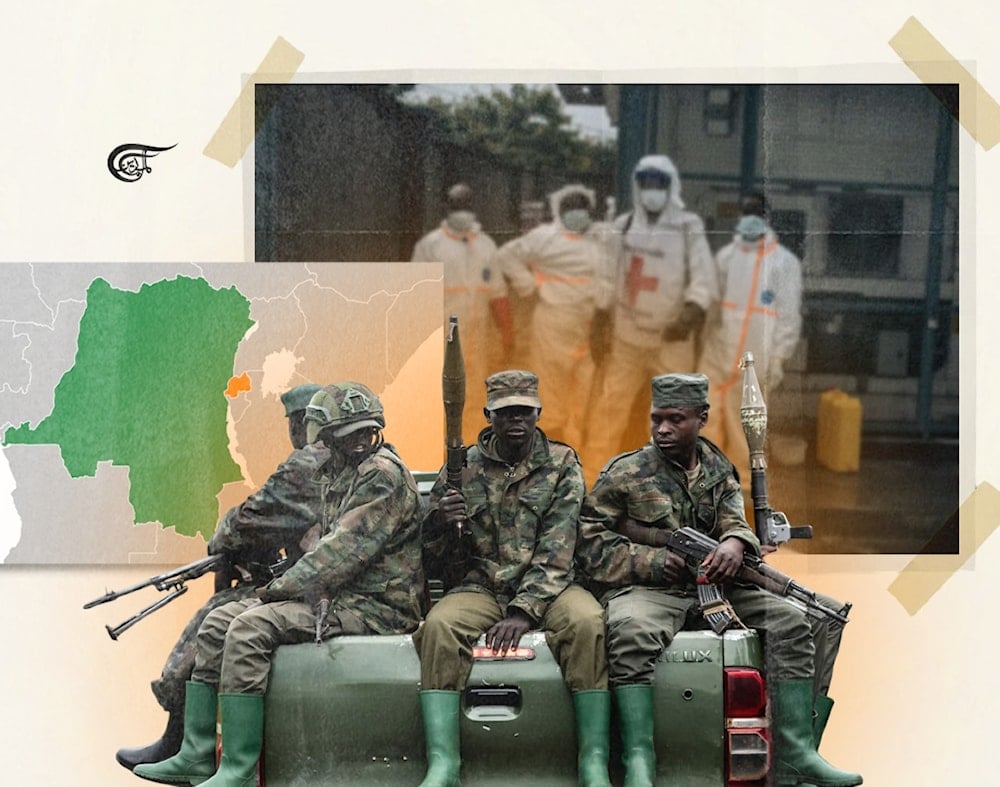What is happening in the DRC?
Rosa Moro exposes the ongoing Western-backed plunder of the DRC’s vast mineral wealth, highlighting Rwanda’s role in the atrocities and the geopolitical struggle over resources amid a worsening humanitarian crisis.
-

The attackers have occupied the airports and the capitals of North and South Kivu, Goma, and Bukavu respectively, as well as other mining towns, so that the supply chain does not stop. (Al Mayadeen English; Illustrated by Batoul Chamas)
The vast territory of the Democratic Republic of Congo (DRC) is probably the richest area of the planet in natural resources, especially in its eastern part, coinciding with the final tail of the Rift Valley tectonic fracture, where minerals emerge from greater depth and in greater concentration. At the same time, its people are among the poorest in the world, according to UN development and poverty measurements. In the face of the standardized narrative of “the curse of wealth”, we must remember that the real curse is not natural wealth, but the capitalist system, which prioritizes economic benefits over people's lives.
Ever since the United States and Belgium, with the support of all the Western powers, put an end to the great Congo's dream of independence by assassinating Patrice Lumumba, the Western powers have exercised control over that wealth by all violence necessary. In recent decades, China has arrived as a new trading partner and is today one of Congo's main exporters of natural resources, although the Asian giant does not use violence to extract raw materials, as the West traditionally does.
It is not the DRC, nor the EU, nor China, nor Russia that has taken the trouble to calculate how much the untapped subsoil of the DRC is worth (in dollars), but the United States. According to the US Geological Survey, the value of Congo's untapped strategic mineral reserves, i.e. the huge Congolese raw materials that already supply international markets are not counted here, is $24 trillion. For comparison, we can put this figure next to the Gross Domestic Product of the entire European Union, which is $17.7 trillion. The “hassle” of making these calculations already gives us an idea of who is after what.
From Davos to Goma
Between January 20 and 24, the World Economic Forum was held in Davos. The president of the DRC, Felix Tshisekedi, went to this forum to sign with investors for a new infrastructure megaproject at the service of foreign powers: the extension of the “Lobito corridor”, with a new 2,600 km railroad line, which will directly link the provinces of North and South Kivu with the ports of the Atlantic coast. The “green” line would cross areas of protected biodiversity such as the Virunga National Park and the forests of the Congo River Basin. But it is “green” because the G20, or rather its core: the G7 (United States, United Kingdom, Canada, France, Germany, Italy, and Japan), has decided so.
In 2023, the United States and the EU, in the framework of the G7, decided to compete against China in the extraction of Congolese raw materials, activating the old Belgian colonial corridor of Lobito, to extract directly the essential raw materials for the green markets of the moment, cobalt, copper, coltan, lithium and others, from the Kivus to the Atlantic. The first ships loaded with tons of these precious minerals already left Lobito in Angola at the end of 2024. Now, Tshisekedi was charged with presenting the West's new public-private mega-investment in the DRC: the “Green Corridor”. A combined investment of 150 billion euros, between the US, the EU, private companies, and the African Development Bank, which will provide 500 million.
The raw materials available in the DRC are so strategic for the new green technological revolution that the Davos Forum openly declares that “resource scarcity is at the top of the list of major risks for the next 10 years”.
Rwanda, the mediator whose job is in the balance
Rwanda signed an agreement with the European Union in February 2024, for the export of strategic minerals (which it does not possess on its own soil, but plunders in eastern Congo) to the European powers, which deliberately close their eyes to the occupation and horrendous crimes committed by the Rwandan regime in Congo since it invaded it for the first time in 1996.
It could be feared that the reactivation of the Lobito corridor, with the expansion that the big companies and Western powers (which the Rwandan regime has been serving since it came to power in 1994) have already begun to implement, will reduce the transit of everything stolen from the Congo through the traditional mediators in Kigali.
Many of us think that this is why the massacres and crimes committed by their soldiers stationed in Congo, who now call themselves M23, intensified during the Davos Forum, to send the message that they are not going to be thrown off the geostrategic chessboard of Congolese resources so easily.
For two years they have been occupying Congolese border towns like Bunagana, and the central government did not even bother to react and, of course, the international community ignored it. From that week of January 20-24 until today, the M23 and some 5,000 Rwandan forces in their support have intensified their horrendous crimes such as the mass rape of some 170 imprisoned women who were later burned alive, or the execution of children carrying weapons stolen from dead soldiers, beheadings of civilians and combatants and much more.
30 years of invasion and crimes
For 30 years, rebel groups at the service of the Rwandan regime have been massacring and plundering the Congo, causing millions of deaths, displacing people, using mass rapes as a weapon of war, and other crimes against humanity... perfectly documented by the UN and other organizations. They have done it under different acronyms: In 1996 they arrived as AFDL, in 1998 they called themselves RCD-Goma; then they became CNDP in 2007, and finally, in 2012, they changed to M23. Always under the command of the Rwandan Armed Forces, but posing as Congolese. Everyone knows it.
This small country and its partner in crime, the Ugandan regime of Yoweri Museveni, could not have come this far without the backing and support of the United States and the European Union.
Although the Congolese government has acted in these 30 years as an ally of the aggressors, or in the service of all of them, as in the current case, the Congolese people know very well who their aggressor is: the West, through its delegates in the region, the Rwandan and Ugandan regimes. That is why, while Tshisekedi was selling his country in Davos and the M23 was attacking Goma, the demonstrators in Kinshasa were burning the embassies of the powers involved in all this: the United States, France, Belgium, Uganda, Rwanda and Japan? Why Japan? I was asked by many people, because of the Asian powers, Japan is the ally of the West, not the new partners who buy materials without massacring the people, China. Japan is a quiet member of the G7. The burning of its embassy is a clear message that the people know too well what is happening to them, down to the last detail.
The Congolese army is ill-equipped and underpaid, it has been suffering for years from infiltration into its ranks of Rwandan “rebels” under all those acronyms mentioned above, with every damned peace agreement pushed by the international community. These military men in the Congolese army in the service of their neighboring aggressors, have assassinated every high command willing to do their duty to fight external aggression, the latest, the assassination of General Chirimwami, on January 23. The DRC cannot count on its own army.
The attackers have occupied the airports and the capitals of North and South Kivu, Goma, and Bukavu respectively, as well as other mining towns, so that the supply chain does not stop. The dead and displaced are in the thousands. Poorly equipped and assisted self-defense movements engage in bloody fighting against the M23, equipped with high-level technology and training. The genocide continues in Congo, and for the moment it does not seem that the umpteenth peace agreements, such as those of Luanda, will stop it. The same goes for the umpteenth peace mission, nothing will change as long as the system that serves all this living hell does not change.

 Rosa Moro
Rosa Moro
 8 Min Read
8 Min Read











